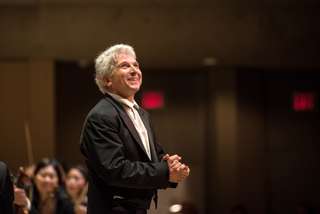|
Back
A grand finale for the Oundjian era Toronto
Roy Thomson Hall
06/28/2018 - & June 29*, 30, 2018
Ludwig van Beethoven: Symphony No. 9 in D Minor, Op. 125 "Choral"
Kirsten MscKinnon (soprano), Lauren Segal (mezzo-soprano), Andrew Haji (tenor), Tyler Duncan (baritone)
The Toronto Mendelssohn Choir, Jen Min-Young Lee (chorus master), The Toronto Symphony Orchestra, Peter Oundjian (conductor) 
P. Oundjian (© Nick Wons)
Two reviews on this website serve to illustrate what Peter Oundjian has achieved in his 14-year stint as music director of the TSO. This one of a 2008 recording of The Rite of Spring and this one of a live (and lively) performance in 2016 of the same work. The earlier performance displays a musician who clearly and unerringly presents the structure of a work with every note in its proper place. (This sounds like faint praise, but one can’t take this for granted.) Eight years later he and his ensemble have moved on to a different level where risks are not just attempted but triumphantly surmounted. This kind of change takes time.
It is not just that over half the orchestra’s players have been replaced during his sojourn here. The normal process of players retiring or moving on has caused this, and the usual vetting of applicants from the large pool of talented musicians coming from music schools has guaranteed a high level of expertise. Oundjian has exerted himself personally in the choice of principal players, concertmaster Jonathan Crow a notable case in point. But his main accomplishment is that he has created a solid, responsive team that can tackle the diverse array of music that the fractured symphony audiences want.
One truly marvelous success has been with the orchestra’s approach to Mozart, despite the presence in this city of a period orchestra, Tafelmusik Baroque Orchestra, with a huge season of its own. Frequent guest conductor Bernard Labadie has helped in this, but we have also heard distinguished playing from guest conductors like Matthias Pintscher. The annual Mozart Festival (a January fixture for 14 seasons) is gone, but Mozart, Haydn and their ilk crop up throughout the season and we can expect this specialty to continue.
Another annual event is also gone, namely the new Creations Festival. I can recall when new pieces were played in a smaller venue (a sort of ghettoization) but Peter Oundjian convinced management to give them more main stage exposure. Results were mixed (as usual with new works), but an actively involved audience has emerged. (And Toronto has other presenters specializing in contemporary works, such as the Esprit Orchestra). The regular seasons will continue to be peppered with commissions and new works from elsewhere.
One innovation that sadly fell by the wayside was the Decades Project, wherein a total of ten select series of concerts over five years was to be devoted entirely to the music of each decade of the 20th century. It did not get past the 1930s; the prospect of selling tickets to series devoted to more recent decades was obviously just to daunting. (Toronto is not unique in this respect.) Recent bumpy changes in management (the details of which are too tedious to recount) could well be a factor.
In the final two months of the Oundjian era local symphony-goers have been treated to an array of major works given what I can only describe as festival-quality performances. Anton Bruckner’s Symphony No. 8 and Gustav Mahler’s Symphony No. 9 were two standouts, each featuring a confident, well-structured performance (to full houses). A Russian evening featuring the Rachmaninoff Piano Concerto No. 3 with Daniil Trifonov was another gala occasion, as was an evening of music inspired by Shakespeare with narration by Christopher Plummer.
Maestro Oundjian’s grand finale was a series of three performances of Beethoven’s Choral Symphony, given a vigorous yet sensitive reading, with the opening notes seeming to melt out of the air. The second movement was energetic and playful, finely controlled. The slow movement was also well-paced with its own dreaminess. The final movement started abruptly but the subsequent first statement of the “Ode to Joy” theme was very quiet, giving it lots of room to build. It was nice to have an all-Canadian group of soloists although the unhappy-looking tenor was miscast. The large chorus (about 120 members) were seated on risers on the platform rather than higher in the choir loft, an arrangement that leads to tighter control. The work is guaranteed to draw a full audience; they came away happy.
What about a successor? Sir Andrew Davis, music director from 1975 to 1988 and conductor laureate since, will take charge for two years while the search continues. (He also stepped in after the departure of Jukka-Pekka Saraste prior to Oundjian’s appointment.) Several orchestras have been or are searching for new conductors. Rumour has it that one or more possible choices “got away” as admired guest conductors have assumed other posts - Gianandrea Noseda in Washington and Thomas Dausgaard in Seattle come to mind. James Gaffigan is mentioned (he appears on many lists), and Donald Runnicles impressed when appearing here. The orchestra has been evolving very nicely and Peter Oundjian leaves it in good shape. Let’s hope recent changes in the orchestra’s management have ushered in a period of administrative stability to support its continued development under a new conductor.
Michael Johnson
|